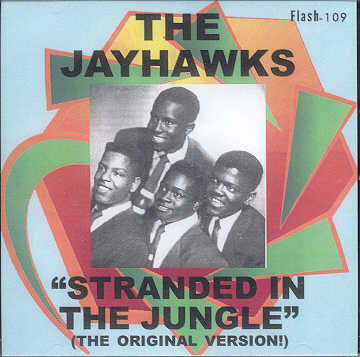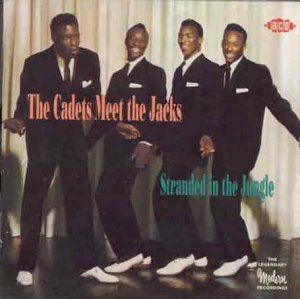Comments
Foggy G, "The Songs That Were Played," We're Only In It For The Touring
1976: Simply one of the better cover tunes that Frank ever did, in this reporter's humble opinion. Pure 50's pop, complete with Tarzan yells and those weird spoken interludes of which 50's pop is so fond. A silly tale of a man looking for Lover's Lane who gets stranded in the jungle, it is well sung by Frank and includes some hilarious interjections by Ray and Bianca. One of those "Why wasn't this on the Stage series?" candidates.
Marc De Bruyn (emdebe@village.uunet.be), September 7, 2003
"Stranded In The Jungle" was written by Ernestine Smith & James Johnson in 1956; the same year this R&B novelty classic was a huge hit for the West Coast vocal group The Cadets (Modern 994). The Cadets version of the song was actually a cover of the Jay Hawks original version, although much more polished and energized.
Austin "Ted" Taylor (tenor), Aaron Collins (lead tenor), Lloyd McCraw (former Dixie Hummingbirds' baritone), and Will "Dub" Jones (lead, stratospheric falsetto, bass) were the original lineup (augmented with Willie Davis, tenor), that begun as a gospel group during the late '40s in Los Angeles, but eventually they became versatile in R&B, jump tunes, ballads, and calypso songs. The band members recorded 20 singles over a three year period (from 1955 to 1958) under two separate identities... It was Modern's Joe Bihari who came up with the idea of having one group with a split personality, envisioning the Jacks as a ballad harmony group (6 releases on the Modern label) utilizing the writing talents of Aaron Collins and the Cadets (14 releases on the RPM label) as an up-tempo and novelty song quintet who mostly covered other acts' material.
The band on most of the group's sessions was lead by tenor saxophonist Maxwell Davis. Davis and Collins would later join the Flares in 1961, while Taylor would enjoy solo success as a blues, soul, and gospel vocalist. Jones joined the Coasters in 1958 and remained there for over a decade.
In late 1954, the quintet—as the Cadets—recorded a version of Nappy Brown's "Don't Be Angry" (Modern 956) and a calypso-flavored cover of "Rolling Stone" (Modern 960), which outsold the original by Excello's Marigolds. Later, the Cadets issued their third single, "I Cried" (Modern 963), backed up singer Dolly Cooper on "My Man", Young Jessie on "Mary Lou", and Richard Berry (1935-1997) on "Jelly Roll" and "God Gave Me You". By the summer of 1955, the Cadets had released "Annie Met Henry" (Modern 969), a single that fell in line with the whole "Annie" craze created in the aftermath of Hank Ballard & the Midnighters' big hit "Work With Me Annie", which had been released some 16 months earlier and was still going strong. The public was quickly tiring of the whole "Annie" phenom, however, so DJs flipped over the 45 and gave the B-side, "So Will I", the push instead.
The Cadets' next Modern release was "Do You Wanna Rock" (Modern 971), an exciting up-tempo revision of the Drifters' big R&B hit (#2) "Whatcha Gonna Do". The song also had a big impact on Hank Ballard and provided the format for Chubby Checker's "The Twist". It was the Cadets' next single, the buoyant "How Soon" (RPM-454), that scored the regional airplay and sales. In early 1956, Prentice Moreland replaced Ted Taylor. By February, the Cadets had moved on to new cover material, including Elvis Presley's "Heartbreak Hotel" (Modern 985) and the Willows' "Church Bells May Ring" (flip).
One day, Bihari and arranger Maxwell Davis handed the group a beautiful ballad titled "Why Don't You Write Me?", the original of which—by the Feathers—was soon to be issued on the Showtime label. They quickly did a cover; the Feathers' original came out in the fourth week of April 1955 and the Jacks' copy came out one week later (on the Modern affiliate RPM). The flipside, Charlie Calhoun's "Smack Dab in the Middle", was actually cut as being by the Cadets and wound up on their first LP. Even though it was recorded by the same group, it was listed as being by the Cadets in keeping with the "two groups in one" philosophy. The Jacks' "Why Don't You Write Me?" (RPM-428) hit the R&B charts on August 6th, and jumped up to #3 R&B by September; it even managed to cross over to the pop charts to reach #82, charting before the Cadets charted with their outlandish cover of "Stranded in the Jungle".
The instant that Bihari heard the Jay Hawks' "Stranded in the Jungle", a rough and ragged original that had been waxed first, then heard the version done by his own act, the Cadets, while in the studio, he knew that his group's was far superior. He quickly pressed up copies and got them to radio stations in strong regional markets across the country and into stores in those areas, before the Jay Hawks' even had a chance to make a move themselves. Released in June of 1956, the song shot up the charts, to #4 R&B / #15 pop. What would prove to be Prentice Moreland's only Cadets/Jacks recording session provided the group with a catch phrase of their own; he delivered the line "Great googly-moogly, let me outta here", on "Stranded in the Jungle"; it was a line he had picked up from a Cincinnati DJ.
Modern tried to forced Moreland to remain with the group instead of leaving for his own solo career, but Moreland quit anyway and was replaced by former Flairs baritone Thomas "Pete" Fox. Moreland later sang with the Colts and went on to become a single artist for various labels, recording for Edsel in 1959, Del-Fi Records' subsidiary Donna in 1960, and Challenge in 1962. Lloyd McCraw also left the group around this time.
"I crashed in the jungle while trying to keep a date, / With my little girl who was back in the States / I was stranded in the jungle, afraid, alone, / Trying to figure a way to get a message back home / But how was I to know that the wreckage of my plane / Had been picked up and spotted, and my girl in Lover's Lane? / And meanwhile, back in the States... / Baby, baby, let's make romance / You know, your old-time lover hasn't got a chance / He's stranded in the jungle, glad as he can be / So, come on pretty baby, just you and me / Meanwhile, back in the jungle... / The boys in the jungle had me on the run, / When something heavy hit me, like an atomic bomb / When I woke up, and my head started to clear, / I had a strange feeling I was with cooking gear / I smelled something cooking, and I looked to see / That's when I found out they was cooking me / Meanwhile, back in the States / Baby, baby, let's make romance / You know, your old-time lover hasn't got a chance / He's stranded in the jungle, glad as he can be / So, come on pretty baby, just you and me / Meanwhile, back in the jungle / I jumped out of the pot, and I finally got away / Frantic and worried about what my baby would say / So, I jumped in the ocean and started to swim / My chances of survival was getting mighty slim / So, I thumbed down a whale who was heading my way / And I reached the States in about half a day / And when I got to Lover's Lane, I was almost dead / But my soul was gone, and here's what I said: / Baby, baby, the man is no good / Oh baby, baby, you should have understood / You can trust me as long as you need, / So, come back pretty baby where you used to be / Cause I love you, / I love you"
"Stranded In The Jungle" was also recorded by the New York Dolls (who created punk rock before there was a term for it, building on the Rolling Stones' dirty rock & roll, Mick Jagger's androgyny, girl group pop, the glam rock of David Bowie and T. Rex, and the Stooges' anarchic noise) for the album "Too Much Too Soon" (1974) and by the a cappella group the Nylons on the album "Run for Cover" (1996).

